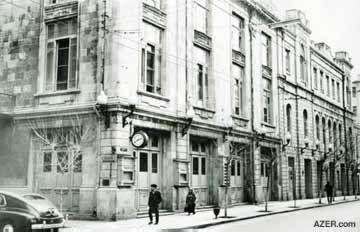|

Summer 2001 (9.2)
Pages
44-47
Concepts of
Time
Sociolinguistically
Speaking - Part 10
by Jala Garibova
and Betty Blair
Clocks: National Archives (Photo and Cinema Division)
  One of the first things that most foreigners
sense when they arrive in Azerbaijan is that Azerbaijanis tend
to have a very different notion of time than they do. This is
especially true of visitors who come from highly organized, time-conscious,
industrialized nations. One of the first things that most foreigners
sense when they arrive in Azerbaijan is that Azerbaijanis tend
to have a very different notion of time than they do. This is
especially true of visitors who come from highly organized, time-conscious,
industrialized nations.
Left:
The Musical Comedy Theater
named after Sh. Gurbanov located on the Boulevard close to the
sea in downtown Baku has since been totally replaced in 1998.
Photo: 1960.
In fact, some Americans told us that the idea of punctuality
in Azerbaijan seems so different from their own that when Azerbaijani
friends suggest a time to meet, the Americans always joke: "Azeri
time or American time?"


A: What time should we meet?
B: At 10 o'clock in the morning.
These differences in expectations
about time can be a source of friction with foreigners. One Japanese
woman who recently spent a year living in Baku said that one
of her greatest frustrations was that Azerbaijanis were so "loose
about the time". In Japan, she noted that people were very
strict about time and made every effort to arrive early for appointments.
But in Baku, she found that although Azerbaijanis would agree
to meet at a specific time, they always conditioned their promise
with the phrase,  (If
God wills), as if to allow for some leeway. When the appointed
hour arrived, the Azerbaijanis invariably showed up late. "Somehow
they never seemed to managed to make it on time," she complained. (If
God wills), as if to allow for some leeway. When the appointed
hour arrived, the Azerbaijanis invariably showed up late. "Somehow
they never seemed to managed to make it on time," she complained.
This relaxed attitude towards time can even be a source of aggravation
for fellow Azerbaijanis. For instance, in the early 1990s when
Azerbaijan had just gained its independence and was facing the
crisis of war in Karabakh and the subsequent displacement of
hundreds of thousands of refugees, Azerbaijan's Secretary of
State complained in an interview with our magazine that the worst
thing about her job was having to cope with the Azerbaijani concept
of time. "Even though Azerbaijanis wear watches," she
said, "they aren't conscious of time. If I ask them to meet
me at 3:00, they show up at 4:00. If I ask them to come at 4:00,
they arrive at 5:00. There's a lot of work to do. This is not
the time to sit still."
  One curious exception to these attitudes
about punctuality relates to the unwritten rules of dating. Azerbaijani
girls expect their dates to be on time, but for their part, there's
a tendency to keep the poor guy waiting. After all, the girl
wouldn't want to show that she is too eager for the rendezvous. One curious exception to these attitudes
about punctuality relates to the unwritten rules of dating. Azerbaijani
girls expect their dates to be on time, but for their part, there's
a tendency to keep the poor guy waiting. After all, the girl
wouldn't want to show that she is too eager for the rendezvous.
Changing Times
Left: The clock at Baku's City Hall which
had stopped in the mid- 1970s was restarted in May 2001. Now
it plays short segments of popular tunes on the hour. Lenin's
portrait is no longer exhibited. Photo: 1972.
But attitudes toward time are changing, especially in Baku. Azerbaijanis
are becoming more conscientious about showing up on time for
their appointments. It used to be that a person could be 40-50
minutes late and not be considered rude and not apologize for
it; now a person is perceived as tardy if he or she arrives 10-15
minutes after the designated time. These days in international
business circles, it is considered quite negligent to be late,
and it does make a bad impression unless the person calls ahead
to announce his delay.
Of course, there is a tremendous variation in attitudes towards
time, as is true in any society, and it is also influenced by
numerous factors including gender, age, economic status, health,
education, health - not to mention, ambition.
But some of the changes have been shaped by new technology that
gives people more control over their time - especially the mobile
phone and private cars. Both have appeared on the scene "big
time" these past five years. Now when Azerbaijanis run late,
especially with meetings with foreigners, there's a greater tendency
that they will phone ahead and let the waiting party know of
the delay or traffic jam. The pace of daily life also seems to
have accelerated in Baku. People even walk around town faster
than they did a mere five years ago.
In the past, the Soviet policy of "equalization" discouraged
any sense of competition for monetary gain. Most people didn't
feel compensated for their extra efforts, so they didn't bother
to work harder or more effectively. Average workers simply went
to work, punched the clock, carried out their routine jobs and
then returned home on time.
  Left: Baku's Opera and Ballet Theater in 1974. The
clock no longer stands nor can cars enter the street which has
since been made into a pedestrian walkway. Left: Baku's Opera and Ballet Theater in 1974. The
clock no longer stands nor can cars enter the street which has
since been made into a pedestrian walkway.
Such attitudes clearly
were not conducive to economic strength and development, and
many would suggest that this issue led to the collapse of the
Soviet Union. As far as personal time was concerned, most Azerbaijanis
these days would admit that they enjoyed more leisure in the
past before they gained independence.
During Soviet times, people didn't feel the crunch of deadlines
like they do today. Azerbaijanis are busier now, and that makes
them pay even stricter attention to time, especially if their
work relates to the international business community.
Azerbaijanis know how to have a good time, to enjoy friendships
and the intensity of the moment. Even if they do arrive late
for meetings, they almost always hang around awhile to enjoy
these relationships. After all, life is so short. Whereas Westerners
often say, "Seize the day!" Azerbaijanis say:

The world is five days.
In regions outside the capital,
however, the older, slower perceptions of time are more prevalent.
When people are not rushed and don't feel short on time, appointments
become even more abstract.

Let's meet after 2 o'clock in the afternoon.
Time for Guests
When it comes to guests, Azerbaijanis (even those in Baku) appear
to have all the time in the world. Hospitality is high on their
list of virtues, possibly because success has so often depended
upon being able to forge strong relationships. They always seem
prepared to entertain guests, no matter what time they stop by.
Unlike Westerners, Azerbaijanis often drop in on friends unexpectedly.
They don't want to trouble the host, knowing that if they had
announced their visit in advance, the host would feel obliged
to prepare a meal for them.
  Left: The Philharmonic now under reconstruction. The
clock no longer stands. Left: The Philharmonic now under reconstruction. The
clock no longer stands.
At the very least, the
host will serve tea, no matter what time the visit takes place.
It appears automatically without even consulting with the guest.
(If they have coffee, they often assume foreigners prefer it
to tea.) Usually something sweet accompanies the tea: homemade
jams, cookies or a ubiquitous box of chocolates that never seems
to get eaten, but always looks so dramatic as part of the presentation.

Anytime is teatime.
(Literally, Where tea, where time.)
If guests arrive late in the
day, it's not unusual for the host to say:

What kind of time is this for a visit?
This expression is not meant
to offend, but rather to show regret that there isn't much time
left to prepare what is considered a proper meal.
Guests are encouraged to linger and stay as long as they want.
Azerbaijanis dare not ask when a person intends to leave, as
it would be considered quite rude:

You can't ask a guest, "When are you leaving?"
Similarly, most local restaurants
in Baku won't close until the last customer leaves - no matter
how late that might be, even 3 or 4 a.m. It's very rare for an
Azerbaijani restaurant to turn a customer away. It's not like
in the West, where you hear, "I'm sorry, it's 10 o'clock
and our kitchen is closed." Nor are restaurant workers likely
to blink the lights to indicate that the customers should start
to think about leaving because the restaurant is closing.
Time to Talk
It's not unusual for Azerbaijanis to carry on long telephone
conversations, even during the day, and yes, of course, at work.
During the Soviet period, it's said that literature lovers used
to read novels to each other for hours over the phone.
  Left: The Electric Train, April 1976. Left: The Electric Train, April 1976.
Lately Azerbaijanis
who are working more on the international business model become
irritated when people call and abuse their time on the phone.
When that happens, they try to find a way to gently and politely
bring the conversation to a close, indicating their willingness
to pick it up later at a more convenient time. They try to be
careful not to offend the caller, especially if it's an older
person or someone not familiar with modern business practices.
Appropriate times for telephoning are different in Azerbaijan
than in many other countries. Azerbaijanis generally don't feel
very comfortable calling someone before 10 a.m. (unless they're
at work). On the other hand, they rarely hesitate to ring someone
(not necessarily even a close friend) at 10:30 p.m., or perhaps
up until about 11 p.m., which by Western standards would be considered
too late. But 11:30 p.m. or later would generally be considered
inappropriate unless they knew the person well.

To make an untimely call (time+less call)
Azerbaijanis don't usually go
to bed until after midnight, and, of course, it's likely to be
later on weekends. The kids usually stay up with the rest of
the family. It's rare for an Azerbaijani family to tuck children
into bed at 9 p.m. so that they can have "free time"
for themselves. Bedtime for kids is not regulated as much as
it is in the West. Parents let the children head off to bed whenever
they get tired; but in general, kids usually stay up until the
grownups go to bed.

He / she [the child] wouldn't go to sleep until everybody
else is sleeping.
Time to Wake
Up
During the workweek, those who are employed get up early, depending
on their responsibilities and distance from work. But sometimes
you come across young people who are neither working nor going
to school, and stay in bed until noon.
On weekends, it's quite usual for most people to stay out late,
sometimes until 2 or 3 a.m. or later. Sunday morning they may
sleep in until 2 or 3 p.m. Since Muslims revere Friday as the
Holy Day, rather than Sunday, many people sleep in late on Sundays.
It's possible that if you call as late as noon that you'll be
waking them up.
Of course, a great number of people choose Sunday morning to
shop at the bazaar, which is always more popular during morning
hours when produce is freshest, regardless of what day of the
week it is.
Value of Time
Even though Azerbaijanis tend to have a relaxed attitude toward
time, Azerbaijani proverbs would indicate that they are indeed
concerned about using it wisely. In this respect, Azerbaijanis
share similar ideas with English speakers.

Time is more precious than gold.

Time is not money, you cannot return it.

You should know the value of time when you are young.

Time flies.

Time is on horse; we are on foot.
There are also verb phrases
about using time wisely, which are similar to those in English:

To lose time

To waste time

To conserve / save time
Many Azerbaijanis believe it is better to make decisions and
do serious thinking in the morning rather than late at night,
as is reflected in this proverb:

The harm of the morning is better than the benefit of evening.
They also warn against procrastination:

Don't put off today's work until tomorrow.
  Stages of Life Stages of Life
Azerbaijanis are very conscious of life cycles and life transitions.
For each stage, there is a certain age by which you should achieve
or accomplish the societal norm.
Left: Baku Railway Station as it appeared
in the mid-1920s.

There's a right time for everything.
For instance, Azerbaijani parents
urge young people to complete their education at an early age.
In many universities in the West, age is not a barrier to studying.
It's no surprise to find a 40-, 50- or 60-year-old in graduate
school sitting beside a 20-year-old. But in Baku, it's quite
rare for someone to enter university after age 20 or so.
Students older than 30 usually take what is called correspondence
classes, meaning that they study on their own and take an exam
at the end of each session. Parents support their children as
much as possible - to the point of hiring private tutors - so
that they will learn while their "knowledge is fresh".

What you learn, you learn while you are young.
Marriage
Many Azerbaijani parents urge their children to get married in
their late teens or early twenties. The phrase  (to marry in time) is rather common, and the concept is quite
acceptable in society - especially for women.
(to marry in time) is rather common, and the concept is quite
acceptable in society - especially for women.

Those who wake up early, and those who marry early, never
lose.
In general, marriage after age
25 is considered to be already too late, especially for girls,
though attitudes are changing among the youth, especially those
who have had the chance to study abroad on scholarships in high
school or college.
Making a Family
Having children is very important for Azerbaijani couples. In
fact, if the wife cannot bear children, it can be used as grounds
for divorce. Girls are encouraged to marry young so that they
will be able to have children and take care of them. No doubt,
the society is also concerned about the difficulties that older
women sometimes face during childbirth.

If she had married on time, she would have had at least one
child by now.
Often, newlyweds are expected
to conceive a baby within the first year of marriage. Even highly
educated young people start their families very early - though
some young people are choosing not to be burdened with family
affairs during the very first years of their marriage, but they
dare not delay for many years. However, the older generation
is still likely to pressure them with traditional norms. A mother
or mother-in-law may might say:

You should have a baby born in time.

It is desirable that you have your baby born in time.
Parents also use the concept
of appropriate time when they try to shield their children from
bad things. For example, if they catch their children smoking,
they're likely to say:

Wait for your time. (Literally, It's not your time yet!)
This usually applies to cigarettes
and alcohol. For young girls, it may also relate to plucking
their eyebrows or using makeup.
Old Age and Death
The elderly are generally revered and respected in Azerbaijani
society. An elderly man may be called  (ancient man), referring to his life experience, wisdom and knowledge
of traditions.
(ancient man), referring to his life experience, wisdom and knowledge
of traditions.

Grandfather Karim is
an ancient man. He would know these kinds of things better.
Other terms include  (white-bearded one), referring to a man, and
(white-bearded one), referring to a man, and  (white sideburns), the female counterpart, meaning respected
elders in the community. Others seek advice from them because
they are recognized for their experience and good judgment.
(white sideburns), the female counterpart, meaning respected
elders in the community. Others seek advice from them because
they are recognized for their experience and good judgment.
An Azerbaijani proverb says:

Respect the elderly,
for you'll become old, too.
One way that Azerbaijanis show respect for the older generations
is by holding Jubilees, such as on the 60th, 70th, 75th, 80th
and 85th birthdays. These celebrations continue regularly, and
if the person is dearly loved and respected by the society, Jubilees
will organized even after a person's death. For instance, this
year in August, Azerbaijanis will be celebrating the 100th Jubilee
of Khan Shushinski (1901-1979), one of their beloved mugham singers.
It doesn't matter that he passed away more than 20 years ago.
While the death of a loved one is always a difficult experience,
death at an early age is especially viewed as tragic - just as
it is in other societies. Here, the Azeri word  ,
meaning "timeless" (in this case, "before the
right time"), is used when someone dies at a young age. ,
meaning "timeless" (in this case, "before the
right time"), is used when someone dies at a young age.

He died young.
(Literally, He left timelessly).
However, for someone who dies
at an older age, the following phrase is likely to be used:

His time came.
After the death of a family
member or relative, Azerbaijanis are very supportive of the surviving
family members. Tradition has established that family, friends
and acquaintances gather every Thursday up until the 40th day,
when there is a large commemoration, as well as on the third
and seventh days following the death. Afterward, yearly anniversaries
are usually marked as well.
To comfort the family, mourners may remind them that time will
eventually heal their pain.

Time cures everything.
(Literally, Time is the medicine for everything).

Time heals all wounds.
To refer to something that is
old, but not necessarily valuable, Azerbaijanis sometimes say
it is  (left from Nikolay),
meaning from the time of Czar Nicholas II (1868-1918), who lost
his throne to the Bolsheviks in 1917. (left from Nikolay),
meaning from the time of Czar Nicholas II (1868-1918), who lost
his throne to the Bolsheviks in 1917.
Of course, they don't literally mean that the item is from Nicholas's
time; it's just an exaggeration, tinged with humor. For example,
if a loaf of bread has gone stale, someone might say: "This
bread is left over from Nikolay's times."

Eh, that dress looks
like one from Nikolay's times (implying that it is very much
out of fashion)!
This same pattern can be used
with Noah, whose ark is believed to have landed on a mountain
in Nakhchivan, the non-contiguous part of Azerbaijan that borders
Turkey. In some regions, Azerbaijanis use the name of Shamil,
a leader of the liberation movement in Dagestan and Chechnya
who fought against Russian invasions in the 18th century.
True friendship, however, only improves with age. Azerbaijanis
greatly appreciate loyalty and long-term friendships. When making
a toast or giving an informal speech about friends, they often
make comments like the following:

We have been friends with Samir for about 15 years.
No wonder there is the proverb:

Everything is good when it is new, the friend is good when
he is old.
Jala Garibova holds a doctorate in linguistics and teaches
at Western University in Baku. Betty Blair is Editor of
Azerbaijan International magazine. The entire archives of the
"Sociolinguistically Speaking" series (now 10 articles)
may be accessed at AZERI.org.
Click on LEARNING AZERI. Yoko Hirose, Fariz Islamzade
and members of the AI staff also contributed ideas to
this article.
______
From Azerbaijan
International
(9.2) Summer 2001.
© Azerbaijan International 2001. All rights reserved.
Back to Index
AI 9.2 (Summer
2001)
AI Home
| Magazine Choice | Topics
| Store
| Contact
us
|






